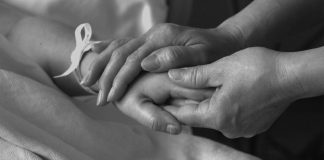How to change a cynic’s mind
Although it is often mistaken for intelligence, especially by those who practice it, cynicism is, in fact, a mask of disappointment. It is toxic to the soul of the individual and to the soul of the community, so we should get rid of it. Here’s how we can do that.
Together to the end of the road
The journey "through the valley of the shadow of death" has never been easy. However, it has become increasingly lonely as our unfamiliarity with death has made us awkward and reserved when interacting with the dying.
The Lord’s Supper: Remembering Christ’s death
Two thousand years ago, Jesus asked us to remember the Lord's supper. What made it so special?
Loving yourself, flaws and all
In a society that is more concerned with form than substance, character ranks second. It is the power of the image that dictates things.
Is disciplining children the responsibility of grandparents too?
“When grandparents enter the door, discipline flies out the window,” poet Ogden Nash once said, encapsulating one of the most common sources of intergenerational conflict—the role grandparents play in the upbringing of their grandchildren.
The Christian citizen
“If it is possible, as far as it depends on you, live at peace with everyone” (Romans 12:18).
Major religions and their perspectives on cremation
Cremation has been part of the death rituals of various cultures since prehistoric times, but with the advent and spread of Christianity, cremation began to be used less and less. Most Christian denominations see it as a taboo. Let's discover why.
More than the slaves of appearances
What is left of me after I shut down my computer, turn off my phone, or wipe away my makeup? What about after I quit my job, after I move, after I lose my health, after I get older? What if no one knew me—would I still be someone?
The Ten: Incredible children in the Bible
With God's help, little guys can do big things too...
Life really is beautiful
Graeme Frauenfelder, 56, didn’t realise until he was an adult that he was the victim of a mental health problem that affects 1.8 per cent of Australian males and 1.7 per cent of females. He’d assumed that his feelings were typical of any kid. But Graeme’s problem has a name. It’s bipolar disorder, which used to be called manic depression. Bipolar disorder is...
How I came to believe
I was a pagan as a child. Not by choice, but as a consequence of lacking any access to the Word of God. In the 1980s Romania, catechizing an Orthodox child (whose parents were members of the Communist Party) was a highly unlikely event Pavlik Morozov’s myth, the hero-child that denounced his own father, generated caution.
The Expanse: Big Sci-Fi tackles bigger questions
Out of all the genres of storytelling that we see in the media we consume, science fiction holds a special place in my heart. While some may pine for the comfort of romance, the tension of a modern-day thriller or the stimulation of a well-crafted fantasy world, I’ve always been drawn to science fiction's ability to create a rich canvas out of imagined futures.
Stories with happy endings | How to keep going despite the obstacles
For some people, suffering is temporary. For others, life itself can be a long series of painful blows. However, experience shows that recovery is possible even when people seem to be at the end of their tether.
Five lessons from the life of Dietrich Bonhoeffer
It takes a brave man to stand up to a dictator and perhaps an even braver one to stand up to his church. Dietrich Bonhoeffer has been held up as a hero of the cause of justice and equality, and a statesman of modern Christian theology. For some readers, these two things might not seem a natural fit. But for Bonhoeffer, the two...
“More than a carpenter” | Book review
Josh McDowell, founder of the trans-denominational Christian organisation Campus Crusade for Christ and author of More Than a Carpenter, is known to the public after a decades-long career and having had several volumes published in the field of apologetics.


























